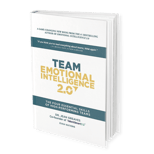Becoming Climate Positive
Landscape Architect Pamela Conrad is Revolutionizing the Way Landscapes are Designed with the Launch of an App

Why EI Matters in the Future of Leadership
Over the last couple of issues, I have enjoyed sharing what I am learning about Emotional Intelligence (EI)—what it is and why it is more important than ever as we begin to understand our human relationship with artificial intelligence. I’ve also learned about how Dr. Daniel Goleman’s five primary EI components show up in the workplace. I’ve written that the most creative, innovative and healthy cultures, and ultimately the most successful companies, understand the importance of EI development within teams and are providing training opportunities at an equal importance to job skill training.
For those who might have missed my two previous blogs, I’ll recap what EI means and provide an overview of the five main EI components. Emotional Intelligence is our ability to understand and manage our emotions and feelings, as well as those of others, in guiding our thinking and then our actions. It is different from the Intelligence Quotient, or IQ, in that it is specific to recognizing emotions and the impact these emotions have in our relationships. Dr. Goleman, who is considered by many to be the leading authority on EI, developed an emotional intelligence theory that outlines five main components:
Understanding our emotional gaps, and continuing to develop and grow our skills, will allow us to establish healthier personal and professional relationships, while also measuring our potential to influence and lead others. To wrap up this blog, I’d like to share two EI resources that I’ve come across in my coaching journey that I believe stand out as effective tools.
 What I like about this book is that it focuses on emotional intelligence within teams and provides simple exercises that can be integrated into monthly or quarterly meeting rhythms. The four essential skills outlined in the book include team emotion awareness, team emotion management, internal team relationships and external team relationships.
What I like about this book is that it focuses on emotional intelligence within teams and provides simple exercises that can be integrated into monthly or quarterly meeting rhythms. The four essential skills outlined in the book include team emotion awareness, team emotion management, internal team relationships and external team relationships.
As I shared in my last blog, people are changing, and effective leadership is changing. Our ability to connect and engage with others, motivate our teams and successfully navigate high pressure situations relies on our ability to understand complex emotions. As we gain understanding, we grow compassion and empathy. We develop a greater capacity to accept beliefs that are different than our own because we gain perspective. We build sustainable and scalable teams to lead us into the future.

Landscape Architect Pamela Conrad is Revolutionizing the Way Landscapes are Designed with the Launch of an App
 Read More
Read More

Manitowoc, WI–May 18, 2023Kurt W. Dramm, a born salesman and friend to all in the horticulture industry, passed away on Tuesday, May 16, at the age...